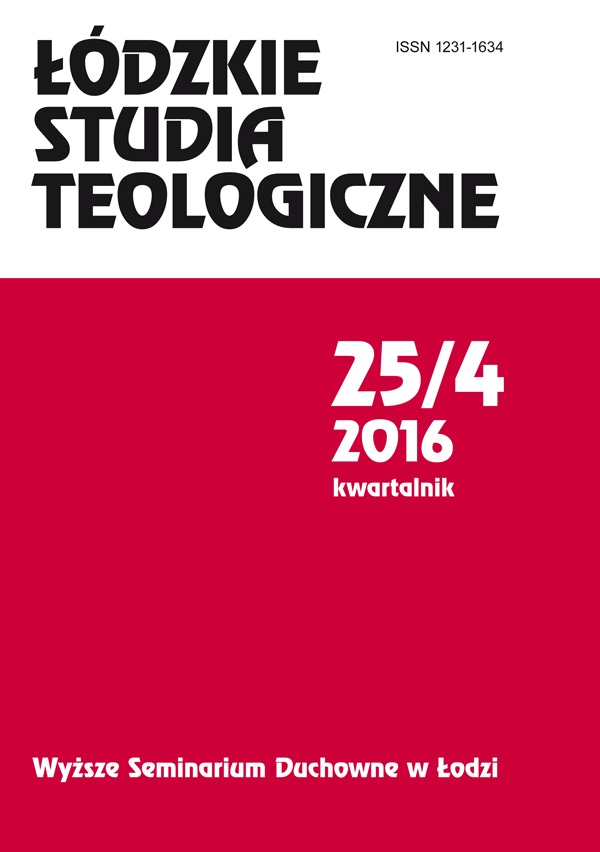
We kindly inform you that, as long as the subject affiliation of our 300.000+ articles is in progress, you might get unsufficient or no results on your third level or second level search. In this case, please broaden your search criteria.

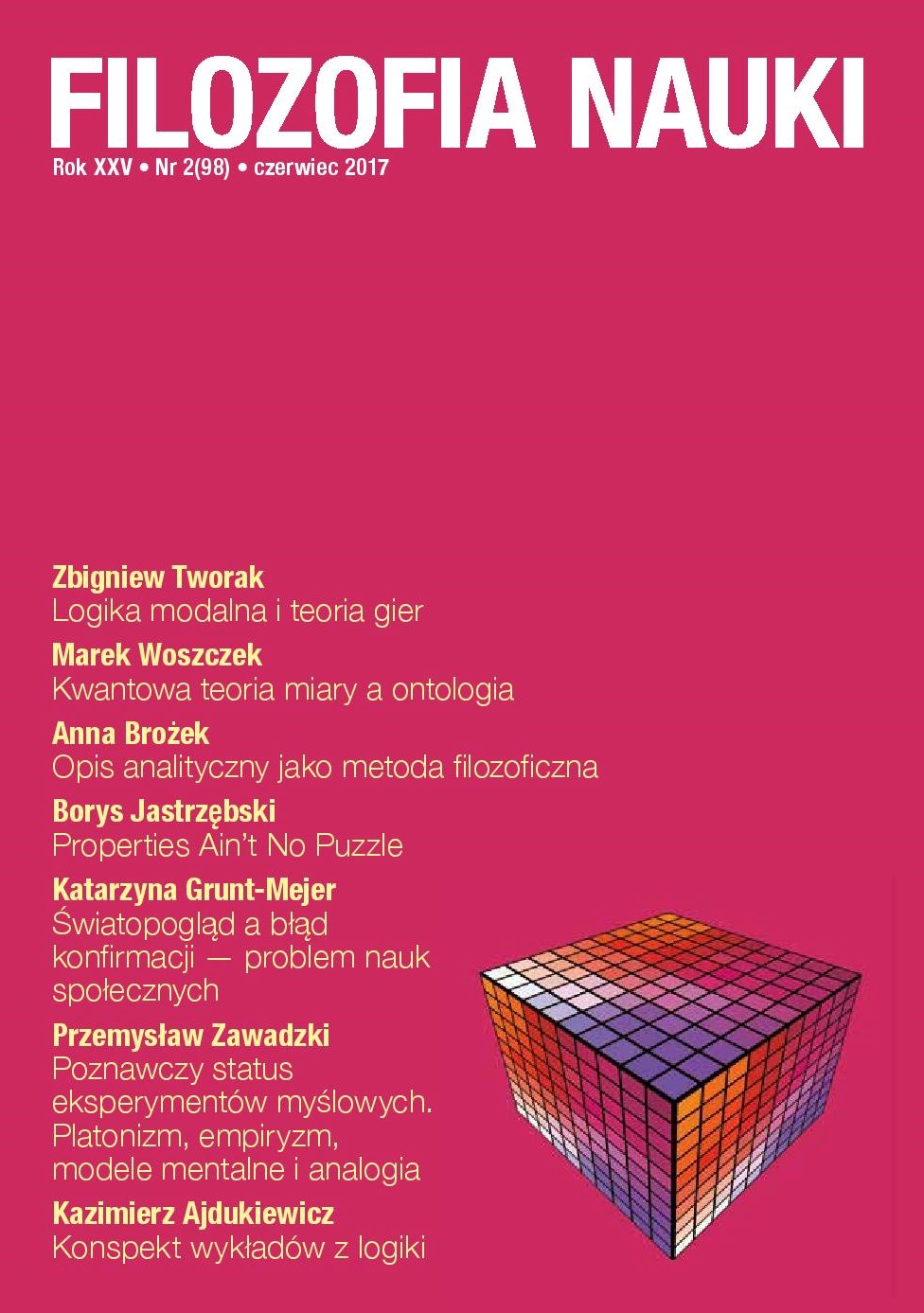
Since noncommutative measure theory plays a central role in the quantum theory, one might say that quantum mechanics is a new generalized theory of probability. That assertion, however, raises many problems with interpreting quantum probabilities and quantum events. Although one can take a radically instrumentalist or pragmatist approach toward this question, it is much more interesting, both theoretically and heuristically, to adopt a realistic or ontological strategy that treats the quantum measure as an effective parameter of an underlying time -symmetric regime of physical dynamics, which only generates the classical events and probabilities at its limit. It is argued that time-symmetric relativistic reformulations of the quantum theory with time-like nonseparability have important advantages over space-like nonlocal hidden-variable Bohmian-type models, which have Aristotelian spacetime as their natural environment.
More...
The aim of the paper is to reconstruct the procedure of analytic description, and to indicate the applications of these procedures in various disciplines. The point of departure is Tadeusz Czeżowski’s approach to the problem of analytic description. The paper consists of three parts. In the first part, some conceptual distinctions and some definitions of different kinds of description are presented. The second part focuses on interpretations of Czeżowski’s conception of analytic description. In the last part, some applications of analytic description in philosophy as well as in natural sciences and humanities are discussed.
More...
Frege’s Commitment Puzzle concerns inferences from sentences such as “Jupiter has four moons” to sentences such as “The number of moons of Jupiter is four”. Although seemingly about completely different things, such pairs of sentences appear to be truth-conditionally equivalent. In this paper, I make a case against versions of the Puzzle that appeal to properties and propositions. First, I argue that propositions in Frege’s biconditionals serve a specific, non-referring conversational role. Second, I claim that the existence of properties derived from Frege’s equivalences relies on a controversial philosophical premise. Third, I contend that it takes more than conversational interchangeability for two sentences to be equivalent and that genuine equivalence has not been established for non-numerical versions of Frege’s biconditionals. I conclude by suggesting that, being restricted to numbers, the Commitment Puzzle may be classified as a local oddity.
More...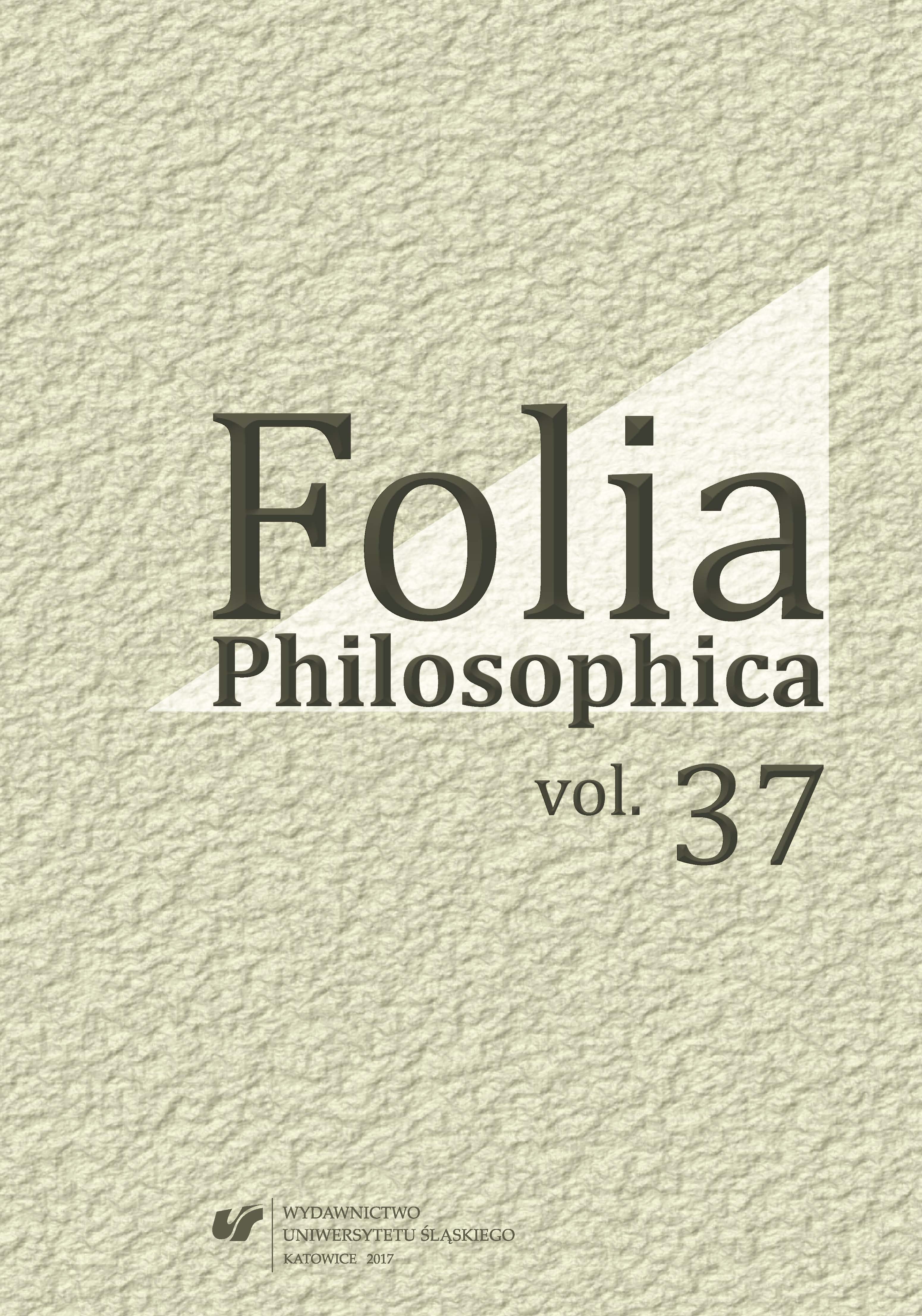
The reception of the British empirical-sensualist tradition as a unique form of philosophising has its special place in the history of philosophy. Jan Patočka takes this fact into consideration, but his reception and interpretation of British empiricism is not purely historical. Patočka was trained by Husserl’s phenomenology and formed by Heidegger’s intellectual heritage, and this is reflected in his original philosophical thinking. Furthermore, his philosophical thought is highly influenced by a motif initially formed on the grounds of Husserl’s phenomenology as the problem of Lebenswelt, in Patočka’s work present as the problem of natural world. Patočka perceives the entire philosophical tradition in the context of this leitmotif. His critical reception of British empiricism was an inseparable component in the rethinking of the problem of natural world. Patočka did not attempt to summarise his attitude towards British sensualism in the form of a stand-alone paper or study. Nevertheless, his reception of the British philosophical heritage of the 17th century is definitely of primary importance — firstly, in the context of the phenomenological tradition (especially its founder E. Husserl), which Patočka joins, and secondly, for the articulation of his own philosophical position. Comments on the British sensualist tradition can be found in various writings from his early as well as late period. His notion of empiricism is always fundamentally interrelated with his other philosophical works — with his interpretation of Husserl and Heidegger and later still more intensely with his own notion of the natural world and his project of asubjective phenomenology.
More...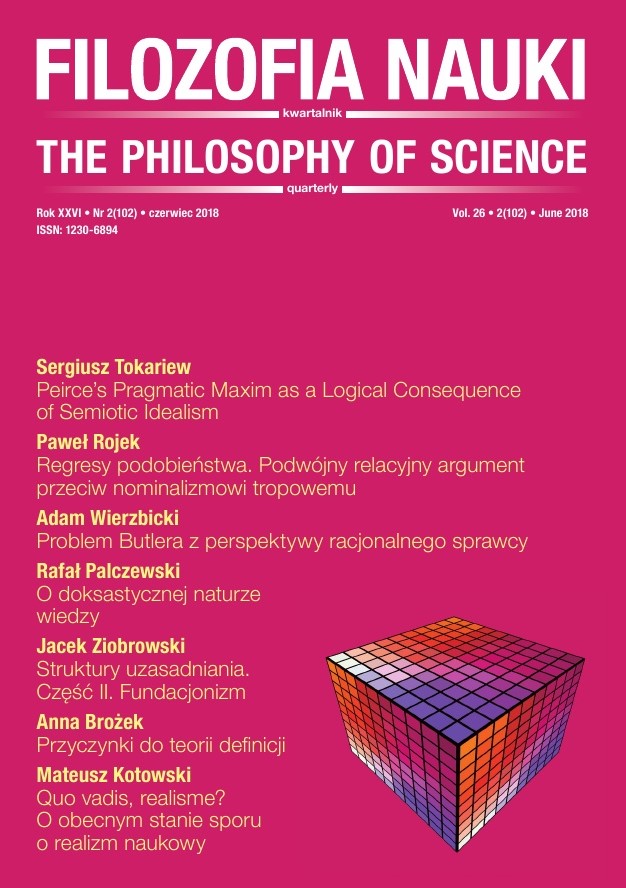
This paper is the second part of a series of articles concerning the structure of justification. The author discusses foundationalism — the most often adopted position on this issue. He distinguishes different kinds of this position and points out the main objections against it. General considerations concerning foundationalism are illustrated by solutions included in the theories of “the late” Laurence BonJour and Robert Audi.
More...
Being the results of conceptual analysis, definitions play a crucial role in philosophy. On the one hand, providing a good definition is often counted as a significant philosophical result. On the other, the lack of a correct definition is sometimes the main reason for futile philosophical controversies. That is why the theory of definitions is among the central aims of the methodology of philosophy. The paper proposes some improvements of the traditional semiotic conception of definitions, especially as it is applied in philosophy. Classifications of definitions are analyzed and new kinds of definitions are distinguished (with respect to structure, genesis, type of sense indicated, etc.). The paper also describes various ways of establishing definitions and reconstructs the criteria of correctness that apply to definitions.
More...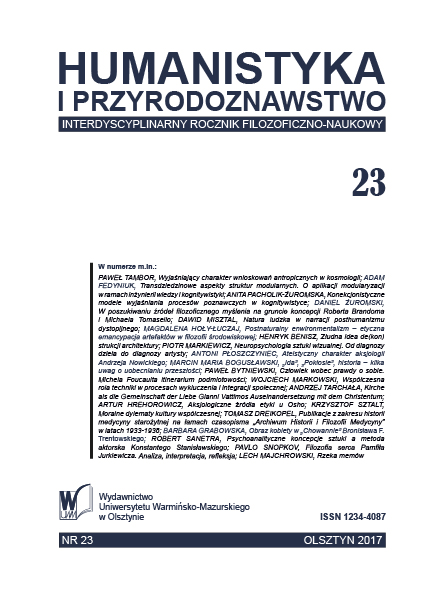
Artykuł stanowi krytykę wybranych koncepcji wyjaśniania w ramach filozofii nauki, które zostały konfrontowane z praktyką badawczą kosmologii. Obok wyjaśniania charakterystycznego dla nauki rozumianej jako fizyka wszechświata pojawiają się nowe typy rozumowań w terminach szczególnego dostrojenia wszechświata do inteligentnego życia. Ujmując te relacje w nomenklaturę eksplanacyjną, tym, co domaga się wyjaśnienia, są takie, a nie inne własności Wszechświata (prawa fizyczne, wartości stałych fizycznych, itp.), natomiast wyjaśniający jest sam fakt istnienia życia biologicznego i świadomego. Ponieważ rozumowania, które rekonstruują relacje między tymi dwoma elementami, nazywane są często wyjaśnianiem antropicznym, zbadana zostanie właśnie taka funkcja zasad antropicznych. Zasadniczą tezą pracy jest stwierdzenie, że wyjaśniający charakter zasad antropicznych można obronić tylko w bardzo specyficznym kontekście metodologicznym. Bronię również wyjaśniania antropicznego w tym sensie, że można na podstawie przesłanek antropicznych formułować predykcje dające się empirycznie testować.
More...
Zastosowanie struktury modularnej w ramach różnych rozwiązań: tak inżynieryjnych, jak i teoretycznych niesie ze sobą pewne ograniczenia. Problemy te są bardzo widoczne w obrębie dyskursu na temat projektowania modularnych ontologii oraz wdrażania technologii Semantic Web. Pomimo szerokiego zakresu problemów związanych z aplikacją modularności w inżynierii wiedzy, istnieje wciąż niewyczerpane źródło innowacji oraz nowoczesnych inspiracji dla przezwyciężania problemów z metamodelowaniem, projektowaniem oraz hybrydyzacją systemów reprezentacji wiedzy. Inspirowanie się naturalnymi przejawami struktur modularnych może stanowić źródło wielu innowacji oraz podłoże do opracowania nowych podejść tak w dziedzinie inżynierii wiedzy, jak kognitywistyki. Z uwagi na nawiązanie do obliczeniowego charakteru struktur modularnych obecnych w rozmaitych dziedzinach o charakterze interdyscyplinarnym, można dotrzeć do konkluzji, że pewne obserwowalne prawidłowości związane z organizacją sieci (np. stopniami i rodzajami centralności) są w istocie transdziedzinowe (tzn. wykraczają poza dziedzinę, w której zostały pierwotnie zastosowane, mając potencjał do wykorzystania w innej dziedzinie badającej struktury relacyjne różnego rodzaju) bądź przynajmniej mają charakter projekcyjny w odniesieniu do metamodelowania ontologii.
More...
Głównym celem niniejszych rozważań jest połączenie trzech idei. Po pierwsze, idei filozofii jako posiadającej charakter pojęciowy w szerokim sensie, której autonomiczną dziedziną badań są pojęcia, a którą będziemy określać mianem filozofii jako działalności pojęciowej. Po drugie, idei głoszącej zgodnie z inferencjalizmem semantycznym Roberta Brandoma, iż źródłem pojęciowości czy też treści pojęciowej jest praktyka społeczna, której modelem jest gra w podawanie i pytanie o racje. Po trzecie, psychologicznej koncepcji podstawowych zdolności poznawczych leżących u podstaw praktyki społecznej, ge nerującej treść pojęciową, czyli hipotezy dzielonej intencjonalności oraz koncepcji myślenia jako współdziałania Michaela Tomasello.
More...
Dla przedstawicieli posthumanizmu dystopijnego dokonujący się na naszych oczach postęp w dziedzinie tzw. biotechnologii, obok nadziei na rozwiązanie szeregu problemów, niesie ze sobą także szereg niebezpiecznych konsekwencji: groźbę modyfikacji istniejącego porządku społecznego, podkopania obowiązujących norm moralnych, konieczność zmiany rozumienia naszej tożsamości. Dla myślicieli takich, jak Fukuyama, Kass, Sandel czy Habermas, niebezpieczeństwa te związane są z naturą ludzką. Stąd też prognozowane kierunki postępu naukowo-technicznego interpretują oni jako zagrożenie dla tej natury. W prezentowanym tekście przyglądam się, w jaki sposób wykorzystują oni pojęcie natury ludzkiej w swoich argumentacjach.
More...

Artykuł jest polemiką z poglądami dwóch XX-wiecznych architektów: Petera Eisenmana i Bernarda Tschumiego, którzy w związku, ale też i poza filozoficzną ideą dekonstrukcji Jacques’a Derridy rozwijali własny zamysł zdekonstruowania architektury. Sięgając do historycznych „korzeni” architektury i korzystając z opracowania Cezarego Wąsa na temat dekonstrukcji w architekturze, autor pokazuje, że zaprezentowana przez tych architektów idea jest złudna, gdyż rozmija się z istotą architektury i prowadzi do destrukcji tej formy sztuki.
More...
Celem niniejszego tekstu jest przedstawienie ateistycznego charakteru aksjologii Andrzeja Nowickiego. Wpierw zrekonstruowano pojęcie ateizmu oraz omówiono najważniejsze wartości w jego filozofii, ze szczególnym uwzględnieniem ich ateistycznego kontekstu. Ateizm jest dla Nowickiego konsekwentnym racjonalizmem, w którym wszystko można zbadać i zakwestionować. Główną funkcją religii jest sakralizacja zjawisk i wyłączanie ich z pola dociekań. Najważniejszymi wartościami dla Nowickiego są: kultura, nieśmiertelność imienia, potomność, płodność dzieł, nowość. Wymienione wartości stanowią ateistyczne ekwiwalenty koncepcji religijnych oraz umożliwiają budowanie świeckiej kultury, która nadaje sens życiu oraz pozwala człowiekowi rozwijać się i być stwórcą samego siebie.
More...
Punktem wyjścia Foucaulta jest stwierdzenie szczególnego rodzaju doświadczenia, w którym rozpoznajemy siebie jako podmiot. Czym jest to doświadczenie? Jak określić jego granice? Sądzę, że itinerarium podmiotowości zostało określone przez dwie intuicje, które rządzą naszym doświadczeniem siebie. Pierwszą jest ta, która podąża za ekspresją siebie, w której to, co własne, staje się obce. Druga to intuicja immanencji. Foucault sądzi, że w obydwu przypadkach tego doświadczania odnajdujemy to samo: normy bycia sobą i faktyczność utraty siebie w sobie. W tego rodzaju doświadczeniu granicznym – bycia sobą poza byciem podmiotem – ujawnia się granica między normami a faktycznością, zaś historyczność podmiotowości staje się ewidentna. Normalna/ unormowana jaźń to nie tylko podstawa bycia istot ludzkich, ale także podstawa rozpoznań siebie jak podmiotu. W konsekwencji wzajemna zależność „zobowiązania do prawdy” i sposobów bycia podmiotem odgrywa konstytutywną rolę w zachodniej „kultury jaźni”. W artykule proponuję trzyetapowy porządek Foucaultowskiego itinerarium podmiotowości rozłożonego na archeologiczną, genealogiczną i hermeneutyczną fazę. W każdym etapie wzajemne uwikłanie prawdy i bycia podmiotem odgrywa kluczową rolę.
More...
W artykule autor dowodzi, że u podstaw etyki Osho leżą indywidualizm i subiektywizm. Wraz z autonomicznym podmiotem, to znaczy człowiekiem postrzeganym jako twórca wartości, stanowią one najważniejsze źródła moralności tej koncepcji. Ponadto kluczową rolę odgrywają tutaj pojęta w sposób bliski Sartre’owi wolność, a także odpowiedzialność, świadomość i samorealizacja.
More...
Przedmiotem artykułu jest namysł nad kulturą współczesną postrzeganą z perspektywy etycznej, a punktem wyjścia przekonanie o kryzysie kultury europejskiej, którego źródłem miałaby być „śmierć Boga” (Nietzsche) czy też klęska „projektu oświeceniowego” (Gray). Istotą kryzysu kultury jest załamanie się dotychczas obowiązujących systemów wartości, co rodzi szereg dylematów moralnych. Typowy dla kultury współczesnej indywidualizm zaoowocował relatywizmem aksjologicznym, doprowadził do atomizmu społecznego oraz, paradoksalnie, zrodził nowe formy zniewolenia. Inną cechą współczesności jest dominacja rozumu instrumentalnego, który głównym kryterium oceny działań czyni efektywność. Konsekwencją tych przemian dokonujących się w kulturze jest z jednej strony zagubienie etyczne, z drugiej zagrożenie wolności i podmiotowości. Czy istnieje jakieś dobre wyjście z tej sytuacji? Być może lekarstwem na moralne dylematy współczesności byłby powrót do aksjologicznych źródeł. Próbę taką podjął Henryk Elzenberg w swojej etyce perfekcjonistycznej.
More...
Filozofia serca, określana także mianem kordocentryzmu, to stanowisko z pogranicza dyskursu religijnego i filozoficznego. Zgodne z nim ludzkie serce jest rodzajem psychofizycznego centrum, które odgrywa kluczową rolę w procesie samodoskonalenia moralnego i intelektualnego. Kordocentryzm stał się ważnym elementem filozofii ukraińskiej oraz rosyjskiej. Bezpośrednim źródłem kordocentryzmu w kulturze Słowian wschodnich były teksty Starego i Nowego Testamentu. Za jeden z ciekawszych przykładów kordocentrycznego myślenia uznaje się twórczość rosyjsko-ukraińskiego filozofa Pamfiła Jurkiewicza. Odnosił się on sceptycznie do założeń materializmu oraz idealizmu, które krytykował z pozycji teoriopoznawczych. Poszukiwał więc takich stanowisk, które pomogłyby mu zbudować bardziej obiektywny obraz świata i człowieka. Wierzył on, iż szanse takie dawała filozofia serca. Wychodząc od jej założeń, zaczął rozwijać własną etykę oraz teorię poznania. Celem niniejszego artykułu jest prezentacja sylwetki filozofa, a także opis oraz krytyczna analiza jego najważniejszych idei.
More...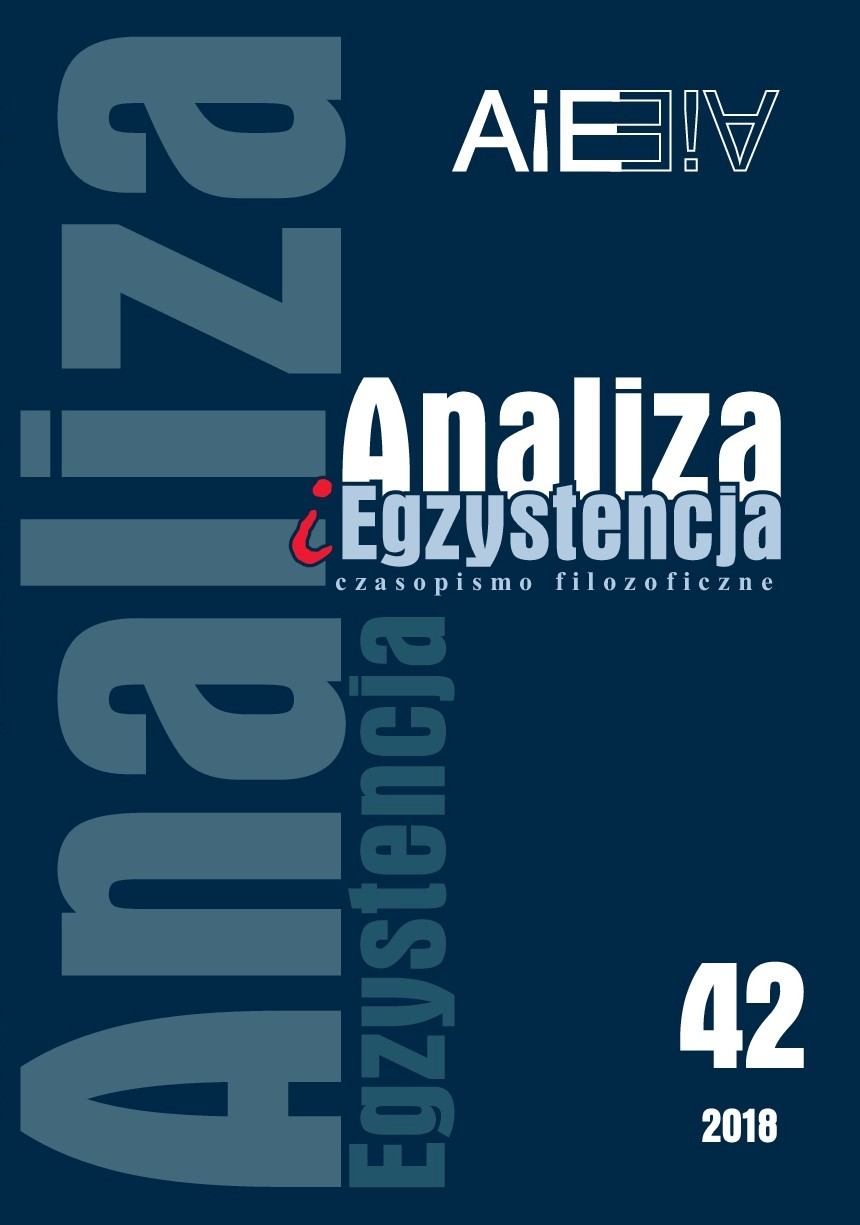
The aim of this article is to present the arguments used in the debate on the legalization of euthanasia and physician-assisted suicide. Opponents of the legalization of the above procedures use the sanctity of life moral argument and the slippery slope non-moral argument. The assumption of the sanctity of life’s argument is the immorality of all forms of killing, the terminal illness and related suffering are not circumstances justifying the interruption [termination] of life. The protection of life is the foundation of the functioning of society. The slippery slope is based on the following premise: if an exception is made to the principle of the inviolability of life in the form of, for example, euthanasia or physician-assisted suicide for terminally ill persons who are of full age and make a free request based on a pressure-free will, this will lead to the killing of the sick, the old or the handicapped without their consent or even against their will. It concerns the changes in social awareness that can lead to the questioning of the value of human life. It is also possible that abuses that are difficult to control may occur. Followers of the precipitation of death formulate two moral arguments: the argument of the autonomy of the individual and the argument of the quality of life. The argument of the autonomy of the individual is presented as an expression of respect for man and the choices he makes. Everyone has the right to decide when his or her own life ceases to be of value to him or her, especially in the case of illness and suffering, and thus to choose the so-called dignified death without suffering or dependence on others. The proponents of this argument state that the principle of autonomy can be just as important or even more important than the sanctity of life principle, and at the same time it is also a response to the medical paternalism. Just this argument has been used in the countries that have legalized the physician-assisted suicide and euthanasia, (Benelux, Canada and in the following states in the USA: Oregon, Washington, Montana, Vermont, California, the District of Columbia and Colorado). Another argument in favor of the admissibility of euthanasia and physician-assisted suicide is the quality of life moral argument which assumes that in certain circumstances life and its continuation are not good for the person. The quality-of-life argument is based on an assessment of whether life is of value to the patient, or whether it remains only a burden or is limited to biological duration, as in the case of persons in a persistent vegetative state, for example.
More...
The aim of this Article is to present the arguments used in the debate on the legalization of euthanasia and physician-assisted suicide. Opponents of the legalization of the above procedures use the sanctity of life moral argument and the slippery slope non- moral argument. The assumption of the sanctity of life’s argument is the immorality of all forms of killing, the terminal illness and related suffering are not circumstances justifying the interruption [termination] of life. The protection of life is the foundation of the functioning of society. The slippery slope is based on the following premise: if an exception is made to the principle of the inviolability of life in the form of, for example, euthanasia or physician-assisted suicide for terminally ill persons who are of full age and make a free request based on a pressure-free will, this will lead to the killing of the sick, the old or the handicapped without their consent or even against their will. It concerns the changes in social awareness that can lead to the questioning of the value of human life. It is also possible that abuses that are difficult to control may occur. Followers of the precipitation of death formulate two moral arguments:the argument of the autonomy of the individual and the argument of the quality of life. The argument of the autonomy of the individual is presented as an expression of respect for man and the choices he makes. Everyone has the right to decide when his or her own life ceases to be of value to him or her, especially in the case of illness and suffering, and thus to choose the so-called dignified death without suffering or dependence on others. The proponents of this argument state that the principle of autonomy can be just as important or even more important than the sanctity of life principle, and at the same time it is also a response to the medical paternalism. Just this argument has been used in the countries that have legalized the physician-assisted suicide and euthanasia, (Benelux, Canada and in the following states in the USA: Oregon, Washington, Montana, Vermont, California, the District of Columbia and Colorado). Another argument in favour of the admissibility of euthanasia andphysicianassisted suicide is the quality of life moral argument which assumes that in certain circumstances life and its continuation are not good for the person. The quality-oflife argument is based on an assessment of whether life is of value to the patient, or whether it remains only a burden or is limited to biological duration, as in the case of persons in a persistent vegetative state, for example.
More...